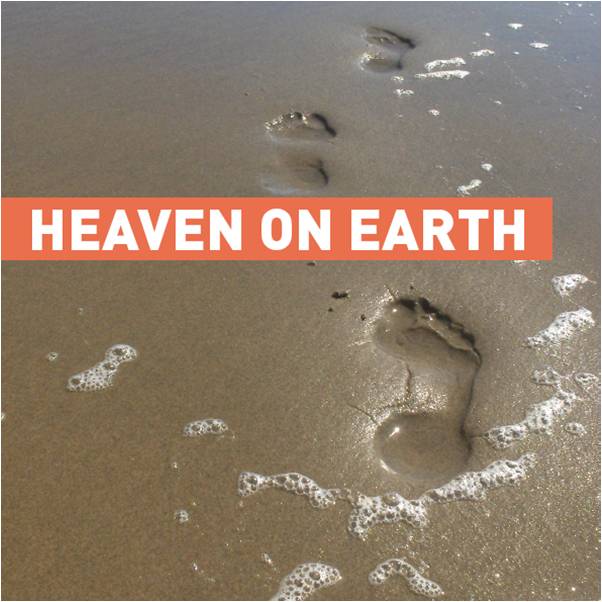Heaven on earth - the beatitudes
Read Matthew 5:3-10
Last week I introduced this series, heaven on earth, by explaining that Jesus sets the scene with the proclamation, “Repent, for the kingdom of heaven is near” (Matthew 4:17). The Sermon on the Mount is Jesus’ response when he sees us - individually and deeply. Knowing us and loving us and offering wisdom for our questions, problems, troubles and life decisions.

The beatitudes are some of the most radical things Jesus ever said; they turn our world upside down. Last week I left you with the puzzle of how it works now not just in the future.
This morning I want to cover three things:
- The heritage and depth to the word “blessed”.
- The word makarios which needs a different perspective, translating it “blessed” rather than “happy”.
- The beatitudes describes the qualities of kingdom people:
- they are not natural qualities;
- they require our active participation – with the grace of God.
1. The rich heritage and depth of the word “blessed”
These first verses in the Sermon on the Mount are often called the beatitudes – that is a translation from the Latin word for “blessed”. The original Greek word is makarios and was used to describe "the state of happiness and well-being such as the god’s enjoy". In the bible it is also endowed with an additional spiritual essence - not unlike the Hebrew word shalom.
Jesus is describing the state of well-being known by people who have repented and are experiencing the presence of God, the kingdom of heaven. Jesus has in mind Old Testament descriptions of the kingdom of God.
Here are several bible texts with which Jesus would have been familiar; look out for allusions and words which appear in what Jesus says in the beattitudes: an all-encompassing awareness of God – leading to us being meek and poor in spirit (not proud, or thinking we can be God). The causes of mourning are gone and comfort is there. We see righteousness and mercy. Violence is banished and we experience peace.
Genesis 1:31
God saw all that he had made and it was very good.
1 Kings 4:20-25
The people of Judah and Israel were as numerous as the sand on the seashore; they ate, they drank and they were happy... He ruled over all the kingdoms west of the Euphrates River, … and had peace on all sides. During Solomon’s lifetime Judah and Israel, from Dan to Beersheba, lived in safety, everyone under their own vine and under their own fig tree.
2 Chron 9:3-8
When the Queen of Sheba saw the wisdom of Solomon, as well as the palace he had built, the food on his table, the attending servants in their robes and the burnt offerings he made at the temple, she was overwhelmed, … “Praise be to the Lord your God who has made you king to maintain justice and righteousness.”
Isaiah 65:20-25
They will not labour in vain, nor will they bear children doomed to misfortune; for they will be a people blessed by the LORD, they and their descendants with them. Before they call I will answer; while they are still speaking I will hear. The wolf and the lamb will feed together, and the lion will eat straw like the ox, and dust will be the serpent’s food. They will neither harm nor destroy on all my holy mountain,” says the LORD.
These were magnificent declarations of God’s purpose for his creation and his people.
Jesus says, “Repent, for the kingdom of heaven is near”. He is drawing on this tradition of history and prophecy. The arrival of Jesus on the earth was an earth shattering intervention of the kingdom of heaven into creation. He ushered in a new era, one in which the kingdom of heaven, though not fully here, is here. The now and the not yet.
We are blessed today by the presence of God in our lives and yet we wait for the time when we will know his presence fully. And at the end of the bible we get a picture of what that might look like.
Revelation 21:1-4
Then I saw “a new heaven and a new earth,” for the first heaven and the first earth had passed away, and there was no longer any sea. And I heard a loud voice from the throne saying, “Look! God’s dwelling place is now among the people, and he will dwell with them. They will be his people, and God himself will be with them and be their God. ‘He will wipe every tear from their eyes. There will be no more death or mourning or crying or pain, for the old order of things has passed away.”
Not happy but blessed, a different perspective
Some contemporary bible translations use the word “happy” instead of blessed when they translate the beatitudes. If you consider the weight of the meaning I have been describing I think you will agree that the word “happy” just doesn’t cut it. It seems a thin, lightweight, watery word to describe what we are discussing.
In the USA’s Declaration of Independence there is this:
We hold these truths to be self-evident, that all men are created equal, that they are endowed by their Creator with certain unalienable Rights, that among these are Life, Liberty and the pursuit of Happiness.
My guess is that when you ask most people what they want in life they will put “happiness” in their top three. Certainly when you talk with parents about what they want for their children they will usually say something like, “health and happiness”.
Ernest Ligon, a Professor of Psychology at Union College in the USA, says,
The beatitudes constitute Jesus’ theory of happiness. They are not so much ethical duties as a series of eight fundamental emotional attitudes. If a man reacts to his environment with them, his life will be a happy one, for he will have discovered the basic formula for mental health.
There is some truth to the proposition that if we live our lives with these attitudes we will be happier. Those of you who have stepped out of God’s will for your life after having followed him for a while will notice that you are in a less happy place. Disobedient, wilful, rebellious people are generally unhappy people. There is a close connection between obedience to God and personal happiness.
But I would draw a distinction between “happy” and “blessed”.

The England footballer, David Bentley, has just moved from Spurs to Birmingham City in an attempt to resurrect his once promising career. Signed by Spurs for £15m in July 2008 as the new David Beckham he has had a miserable time of it – both in not getting selected to play and with injuries. I heard him on the radio the other day,
“Every day I wake up and I am sort of blessed to be a footballer, I know how lucky I am.”
He hasn’t been happy over the last couple of years but he has been blessed.

I would say, “I am blessed to live in Yorkshire”. I love living here; it’s relatively safe, there are superb cities and we are on the edge of some of the most beautiful country in the world. We are truly blessed.
That doesn’t mean I am happy all the time. If I lose a business deal I am not happy, if I am in pain I am not happy. But I am still blessed to live in Yorkshire.
Likewise, to repent and be a follower of Jesus, a citizen of his kingdom, makes me truly blessed, but I may not always be happy. In fact the 2nd beatitude doesn’t make sense if we say happy, “Happy are those who mourn…”? It’s an oxymoron.
- “Happiness” is a good thing but it is about how we feel.
- “Blessed” describes how God feels about us and about our circumstances.
Happy describes whether we have that temporary cheerfulness that puts a spring in our step and a smile on our faces.
Blessed describes our state of being the King’s son or daughter who has been rescued, ransomed, forgiven. Experiencing something of heaven on earth.
Jesus is not saying, you are happy if you behave like this and as a result you will have that. It’s not, if you make peace you will be called a son of God and be happy. He is saying, repent and the kingdom of heaven comes near and this is what it looks like.
Let me re-phrase the beatitudes in such a way as to try and illustrate this a little more (the Message is good at this):
- Blessed are those who experience the kingdom of heaven because they will come to rely humbly and entirely on God, they can stop trying to make it on their own;
- Blessed are those who know the comfort of their heavenly father because they will be able to mourn;
- Blessed are those who have been saved because they will start to obey and see their lives change;
- Blessed are those who have experienced God’s mercy because the desire for vengeance will be displaced by a merciful nature;
- Blessed are those who can hold the gaze of Jesus because they experience his forgiveness and acceptance and gradually their spirits become pure;
- Blessed are those who are known as God’s people because they will get opportunities to bring about peace, overcoming evil with good.
- Blessed are those who experience the kingdom of heaven because they will stand out from the crowd, their lifestyle will offend others and give rise to discrimination and maltreatment.
One day we will know God’s full blessing, one day we will see the new heaven and the new earth, until that time we live in a state of knowing we are blessed, yet living in a world that is not yet redeemed.
Last week I was talking to the manager of the business next to our offices. He is a Christian and has just come back from a trip to the Ukraine where he is aware of some amazing things going on in the growth of the church. But he said an interesting thing. Describing walking around the city he said, “It is a harsh, nasty place but you also sense the presence of God. It’s like living in parallel universes, like heaven on earth.”
This is the type of living that Jesus describes. Almost a parallel universe, we live lives firmly rooted in the daily reality of Yorkshire weather and yet we are also living with the awareness and with the power of the risen Son of God. We know the blessing of his kingship and it brings a completely different perspective to everyday life.
The beatitudes describe the qualities of kingdom people
Jesus isn’t teaching us these things simply to give us a new perspective though. He is calling us to live differently, to make different decision about what is important and how we behave. Kingdom people, being blessed, have different qualities of life:
They are not natural qualities
You can’t find these qualities within yourself and then somehow rustle up the kingdom of heaven. You can’t live a kingdom life calling on the power within you, thinking positively or taking hallucinogenic drugs. The follower of Jesus receives his grace and can drink deeply of his Holy Spirit to receive power for participation in the divine nature – for kingdom living.
I can’t say, “Ah there’s someone who is meek, they will do fine for heaven.” Or, “I can see you are a peacemaker, come and join the church”. It is because someone is in the kingdom that they become meek or a peacemaker.
There is no other way that people can live like this. They are not natural qualities.
These qualities require our active participation with the grace of God
The beatitudes are for those who have given their lives to follow him. For those who are filled with the Holy Spirit and have drunk deeply of his forgiveness, mercy and wisdom. It is a lifetime calling to becoming more like Jesus, more like a kingdom person.
It isn’t a switch you turn on and all of a sudden you are a beatitude person. Yes, we have received grace for salvation but now it is time to press on and work it out.
Paul says in Philippians 2:12-13:
Therefore my dear friends, as you have always obeyed, continue to work out your salvation with fear and trembling, for it is God who works in you to will and to act according to his good purpose.
From time to time I come across people who are enthusiastic about a new way of doing church or a new book or a new healing model or a new prophet who is in town. As though there is a simple formula for the Christian life. As though we can sidestep the hard yards of weeping over our wrongdoing, repenting and going through the hard process of dying to sin, going to recovery, being accountable in our lives, committing to a small groups, going to counselling, reading the bible, giving our money and making small steps of progress toward following Jesus.
I hear you ask, "but David, I thought you said there has to be grace, that there is nothing I can do to earn my salvation." That’s right - but discipleship and human activity are not in opposition to grace. Grace is in opposition to merit, to thinking you can earn your way into the kingdom.
Grace has rescued us, now we must press on, go after it, run hard after those qualities you see in the SotM. But all the time understanding that we can only ever work this stuff out in our lives by the grace of God.
Are you willing to live a life with times of unhappiness but under God’s eternal blessing?
- I am not happy at work at the moment but I am going to be the peacemaker with this aggressive, angry person who is making life difficult for everyone.
- I am fearful of never finding a spouse but I know that going out with this non-Christian is not in God’s will and therefore I am going to break up even though I won’t be happy.
- My marriage is a nightmare and making me unhappy but I know that as a blessed person I am called to keep my vows.
- I am not happy at not being able to go on such good holidays as everyone else but I know that as a blessed person I need to avoid perpetually getting into debt.
- I am not happy being ill but until I get better (if I do) I will work at letting God’s blessing on me come out in an attitude that doesn’t complain but that seeks to bless others.
A kingdom person, someone who follows Jesus and is living in his blessing has also to do their part to develop kingdom qualities in their lives. They have to turn down the temptations of sex outside marriage, over-spending, bad language, gossiping, complaining. They have to address addictive behaviour. It may feel like a rejection of what makes us happy but in the end a lifestyle of disobedience leads to pain and unhappiness.
I will explore this some more next week. What I have taught so far is:
- The Sermon on the Mount is Jesus’ explanation of life in the kingdom once we have repented. He sees us and knows us and offers this guidance for life.
- The heritage and depth to the word “blessed”.
- The word makarios which needs a different perspective, translating it “blessed” rather than “happy”.
- The beatitudes describes the qualities of kingdom people:
- they are not natural qualities;
- they require our active participation – with the grace of God.
Let me summarise by reading Philippians 2:12-13 again.
Therefore my dear friends, as you have always obeyed, continue to work out your salvation with fear and trembling, for it is God who works in you to will and to act according to his good purpose.
This is the promise God makes to us. I have called you, through repentance into the kingdom of heaven. Choose obedience and work at your attitudes and behaviour. Everything you need is available for you. Through his grace you can know the blessing of God in your everyday life; heaven on earth.
David Flowers, 17/01/2011